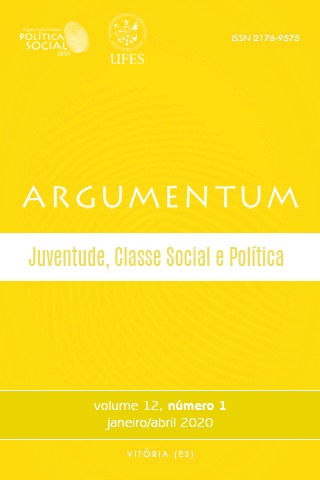Direito Penal do inimigo e política brasileira de encarceramento em massa
DOI:
https://doi.org/10.18315/argumentum.v12i1.21407Abstract
Este artigo tem como objetivo discorrer acerca do Direito Penal e a teoria do Direito Penal do Inimigo, proposta por Günther Jakobs, num aspecto histórico-crítica, à luz do contemporâneo Direito Penal crítico. Para tanto, analisa-se a atual conjuntura da política criminal brasileira, bem como da teoria do direito penal do inimigo. Expõe-se os malefícios de uma política criminal de caráter exclusivamente repressiva, sua relação com a mídia e os riscos decorrentes das leis que são criadas em caráter emergencial no intuito de solidificar o simbolismo do direito penal e a subcidadania, ferindo direitos fundamentais. Debatem-se os principais aspectos da teoria do direito penal do inimigo, sendo explicitadas algumas das suas críticas. Por fim, conclui-se que a Justiça Penal deve-se basear num posicionamento político-criminal minimalista e garantista, condizente com o Estado Democrático de Direito, com intuito de prevenção geral dos crimes e vedando as penas cruéis, utilizando-se das penas e medidas alternativas. A metodologia empregada foi a pesquisa bibliográfica e documental, composta pela análise de documentos oficiais, do ordenamento jurídico e doutrina.
Downloads
Downloads
Published
Issue
Section
License
Copyright Transfer Agreement
As a condition for submission, the authors must agree with the Copyright Transfer Agreement, by checking the box after reading the clauses.
The author(s) (hereinafter "AUTHOR") hereby agrees to transfer, without any financial compensation, the property of copyrights regarding Argumentum, a journal of the Postgraduate Program in Social Politics (Programa de Pós-graduação em Política Social), Federal University of Espírito Santo (Universidade Federal do Espírito Santo) - Av. Fernando Ferrari, 514 - Goiabeiras 29075-910, Vitória (Brazil), (hereinafter "ARGUMENTUM"), according to the following terms and conditions:
1. I am aware of the terms of "Care Ethics Research Guide" described in the Policies section.
2. AUTHOR warrants to be the writer and copyright holder of the WORK submitted.
3. AUTHOR declares that the WORK does not infringe the rights of third-parties; that the distribution of images (if existent) was authorized; and that AUTHOR assumes total moral and property responsibility for their content.
4. AUTHOR agrees to transfer all the copyrights concerning the WORK to ARGUMENTUM, especially the rights to edit, publish, translate into another language, and reproduce it through any process or technique. ARGUMENTUM becomes the exclusive owner of the rights regarding the WORK, and any total or partial reproduction, in any other medium, printed or electronic, is strictly forbidden without prior written consent by ARGUMENTUM.
5. The copyright transfer is unpaid and, therefore, there will be no monetary compensation whatsoever by ARGUMENTUM in order to use the TEXT.


